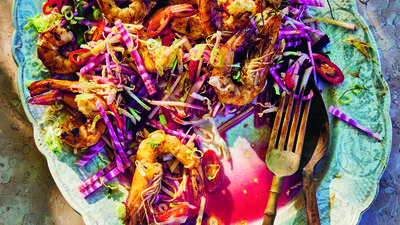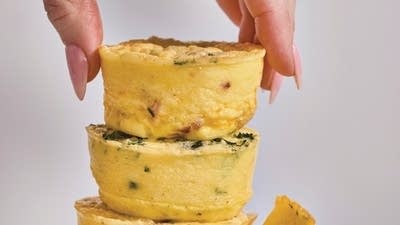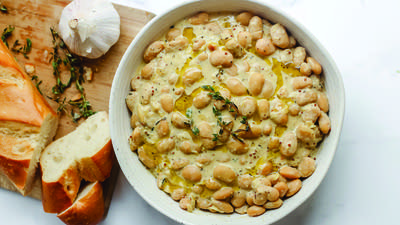
Photo: Fred Ruiz and Kim Ruiz Beck are cofounders of Ruiz Foods. Photo by Lisa Morehouse
You may not know the Ruiz family by name, chances are you, or your kids, have eaten their food. That's because the Ruizes are burrito royalty in California. Their food is in every convenience store you go in, every college dorm, hundreds of school cafeterias, and thousands of family freezers. Contributor Lisa Morehouse of California Foodways takes us to California's Central Valley, to the town of Dinuba, to learn how one of the country's most everyday foods is at the heart of a multi-million dollar family business.
Transcription of field piece by Lisa Morehouse:
This is one of the plants owned by Ruiz foods, the largest manufacturers of frozen burritos -- in fact all frozen Mexican food -- in the country. And this factory, it’s like the Willy Wonka of Mexican food. Now, the company won’t let me tell you much about what goes on in the factory -- it’s all a proprietary process -- but what I can say is that I see thousands of burritos, quesadillas, and taquitos, most of which will be sold under the El Monterey brand. Over 1,600 people work here, and many fold or roll products by hand. Still other products are folded, incredibly, by machine, all headed obediently down what look like miles of conveyor belts moving towards a spiral freezer.
Company cofounder Fred Ruiz tells me the family’s originally from Chihuahua, Mexico, but fled during the Mexican Revolution, when his father was just a boy. As landowners, the Ruiz family felt targeted.
Fred Ruiz: My dad remembers everybody being piled into this car in the middle of the night and there was lots of guns and bombs going off.
They settled in Los Angeles. Fred Ruiz says his dad Louis was a born entrepreneur, selling feather dusters, then clothing door to door. The family moved to Tulare County in the 1950s when Louis Ruiz and his brothers started a tortilla business
FR: I think what my dad realized at the time is there were opportunities to sell Mexican food in the San Joaquin Valley.
To learn more, I decided to talk to an expert: Gustavo Arellano, author of Taco USA: How Mexican Food Conquered America. He says, the flour tortilla that defines a burrito is a Northern Mexican staple.
Gustavo Arellano: Urban legend is that first people who created dish now called burritos were miners in Sonora.
In copper mines between Sonora, Mexico and Arizona.
GA: They would would wrap all their food in big flour tortillas...
And ride donkeys or burros down into the mines.
GA: So they called these burritos or little burros.
 Burritos on conveyor belt at Ruiz Foods facility.
Photo: Lisa Morehouse
Burritos on conveyor belt at Ruiz Foods facility.
Photo: Lisa Morehouse
He says burritos really entered the US in the 1940s during the bracero program, when tens of thousands of Mexican temporary agricultural workers came to the country. The American farm owners fed these workers rice and beans wrapped in a flour tortillas. Eventually the burrito entered the mainstream, starting with Taco Bell and Del Taco in the 1960s, and Chipotle in the 1990s. But Mexican food has been in American grocery stores since the 1890s, first with canned tamales, beans, chili sauce.
GA: Starting in the 1930s you have a man named George Ashley who starts putting tortillas in a can.
Not all, but most of these food producers were white. Most of their customers were white people who lived near Mexican Americans and their food.
GA: Once Americans taste Mexican food they need it and it becomes a part of their life and they’re going to try to replicate in home one way or another.
And that’s the environment in which Louis and Fred Ruiz started their business in the 1960s. They had a primed customer base in the racially diverse Central Valley. And the perfect muse: mom.
While Fred and his dad developed recipes for their first products, his mom worked at a shoe store in downtown Tulare.
FR: I would be working on some sauce at our factory and it just didn’t taste right. So, I would put it in a little dish, and I’d drive over to the store. I’m there, I’ve got sauce all over my t-shirt, I smelled like an enchilada, and I’d say, "Mom, taste this." And then she would tell me, it just needed a little more oregano, a little more garlic.
In fact, the test kitchen is still called Rosie’s Culinary Center. Kim Ruiz Beck says her grandfather served as both delivery man and sales guy.
Kim Ruiz Beck: He would drive the truck, pull in, deliver all the product in the back of the grocery store. Then he would drive around the front and change into a suit.
He would meet with the manager to try to make more sales. Ruiz Foods grew to be a top Latino-owned business, but Fred Ruiz and his dad started in 1964, before major advances in civil rights.
FR: There were some challenges, just growing up as a kid being Mexican. I asked this girl if she’d go on a date one time and she said she couldn’t because I was a Mexican; her dad wouldn’t let her date Mexicans. In business, there were some challenges we had to overcome in terms of growing our business. Some people didn’t believe that we were going to grow our business.
But Kim Ruiz Beck says, by the 1980s, a new piece of technology transformed the business: the microwave.
KRB: Every home has a microwave. That really is the key to our product success.
 Some foods are still made by hand before being frozen and packaged at Ruiz Foods facility.
Photo: Lisa Morehouse
Some foods are still made by hand before being frozen and packaged at Ruiz Foods facility.
Photo: Lisa Morehouse
Ruiz Foods started growing into the multimillion dollar a year business it is today. For the company to stay on top, the family says, they’ve had to innovate, adding breakfast items, fusion foods, and something called Tornados. They’re like flautas or taquitos, developed specifically to fit on convenience store roller grills, the ones that usually hold hot dogs. But their number one retail product is still a bag of eight frozen burritos.
KRB: My whole life, this is all I know, all I know is burritos!
Now the Chairwoman, Kim Ruiz Beck started working at her family’s company 40 years ago.
KRB: This is all I ever wanted. I'm so proud of my dad and my grandpa. I just wanted to be a part of this business. You know, this is not real professional, sorry, but I love this business, I love what they’ve created, I love what we do in the community.
Through lots of philanthropy. And, she says, she loves knowing that they’re reaching so many people through food.
At a town park a mile away, I ask a group of teenagers on skateboards about Ruiz Foods. They’ve got friends and family who work at the factory and say though they prefer homemade Mexican food, they eat El Monterey burritos for convenience and the low price tag. An eight-pack of bean and cheese burritos costs under four bucks. Compared to other convenience store fare:
Skateboarder: A bag of chips $1.69 and soda’s a dollar, so it’s like $3.
And what’s clear, talking to these guys basically in the shadow of the Ruiz Foods factory, is their products are in a lot of our lives, whether we know it or not. These burritos are everywhere, but their roots are right here, in the Central Valley.
Before you go...
Each week, The Splendid Table brings you stories that expand your world view, inspire you to try something new, and show how food connects us all. We rely on your generous support. For as little as $5 a month, you can have a lasting impact on The Splendid Table. And, when you donate, you’ll join a community of like-minded individuals who love good food, good conversation, and kitchen companionship. Show your love for The Splendid Table with a gift today.
Thank you for your support.
Donate today for as little as $5.00 a month. Your gift only takes a few minutes and has a lasting impact on The Splendid Table and you'll be welcomed into The Splendid Table Co-op.




